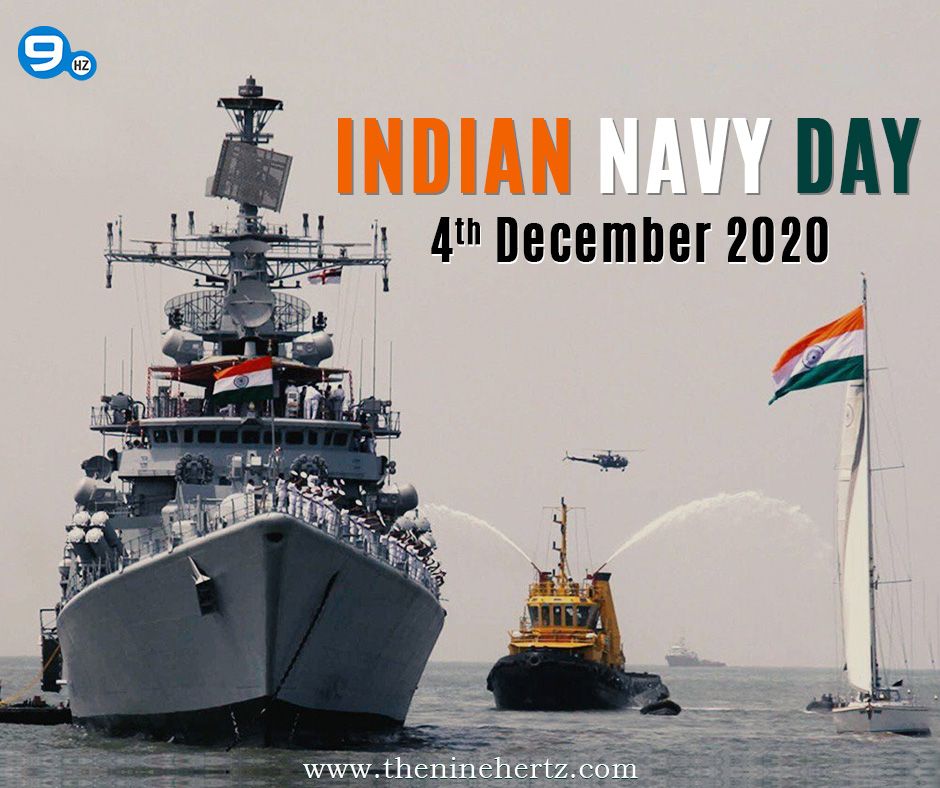

December 4 is observed as Indian Navy Day to honour the Indian Navy's contributions to the country's defence and maritime security. The Indian Navy plays a crucial role in protecting India's vast coastline and maintaining the security of its trade routes. This day marks the anniversary of the Indian Navy's victory in the 1971 Indo-Pakistani War, where the Navy launched a decisive attack on Pakistan's naval base in Karachi. The day is filled with celebrations and events to recognize the bravery and sacrifices of the men and women in the Indian Navy.
Commemorating Indian Navy Day: A Legacy of Maritime Prowess
Background
Indian Navy Day, celebrated annually on December 4, pays homage to the unwavering contributions of the Indian Navy in safeguarding the nation's maritime borders and ensuring the security of its trade routes. This day holds immense significance, commemorating the Indian Navy's pivotal role in the 1971 Indo-Pakistani War.
During the war, on December 4, 1971, the Indian Navy launched a daring attack against Pakistan's naval base in Karachi. This decisive operation, known as Operation Trident, led to the sinking of several Pakistani ships and effectively crippled Pakistan's naval capabilities. The Indian Navy's victory cemented its reputation as a formidable force in the region and earned it global recognition.
Importance
Indian Navy Day serves as a testament to the Indian Navy's unwavering commitment to the defense of the nation. The day is marked by various celebrations and events across the country. These events aim to honor the bravery, dedication, and sacrifices of the men and women who serve in the Indian Navy. They also provide an opportunity to showcase the Indian Navy's capabilities and its crucial role in maintaining regional peace and stability.
Top 5 FAQs and Answers
1. When was the Indian Navy established? The Indian Navy traces its origins back to 1612 when the East India Company established the Bombay Marine. It was officially renamed the Indian Navy on August 15, 1947, after India's independence.
2. What is the motto of the Indian Navy? The motto of the Indian Navy is "Sam No Varunah" (May the Lord of the Waters be Auspicious Unto Us).
3. What is the role of the Indian Navy in the Indian Ocean Region (IOR)? The Indian Navy plays a vital role in maintaining peace and stability in the IOR. It participates in joint exercises, conducts patrols, and provides humanitarian assistance to countries in the region.
4. What are the key challenges faced by the Indian Navy? The Indian Navy faces several challenges, including the rise of non-traditional security threats, such as piracy, terrorism, and asymmetric warfare. It also needs to modernize its fleet and acquire advanced technologies to maintain its capabilities.
5. What are the future plans for the Indian Navy? The Indian Navy has ambitious plans for the future, including the acquisition of new submarines, aircraft carriers, and other modern warships. It is also focusing on developing indigenous capabilities and strengthening its presence in the IOR.
Conclusion
Indian Navy Day is a day of pride and celebration for the nation. It is an opportunity to recognize and honor the sacrifices and contributions of the Indian Navy, which stands as a symbol of India's maritime power and dedication to safeguarding its sovereignty. As the Indian Navy continues to evolve and modernize, it remains a cornerstone of India's defense and a vital force for ensuring the security of the nation and the well-being of the region.

In an attack at a public Hanukkah celebration at Bondi Beach, Sydney, a father-son duo opened fire, killing 16 people and injuring 40. While one gunman has been identified as Naveed Akram, the other has been identified as Sajid Akram, both Pakistani nationals. It was revealed that Sajid Akram had held a gun license for 10 years, and his son was previously investigated by Australia's domestic intelligence agency for his ties to an IS terrorism cell. The shooting has been condemned as a deliberate targeting of the Jewish community on the first day of Hanukkah.

The two men responsible for the Bondi Beach mass shooting have been revealed as a father and son duo. New South Wales police have identified the shooters as 24-year-old Naveed Akram and his father, Sajid Akram, aged 50. Naveed was apprehended at the scene and is currently in a critical but stable condition under police guard. Meanwhile, Sajid, who owned a fruit shop, was killed at the scene of the attack.

The city of Los Angeles is on high alert after a horrific mass shooting at a Hanukkah celebration in Sydney, Australia, which claimed the lives of 16 people. In response, the LAPD has announced additional patrols at Jewish facilities and events throughout the county, while also expressing solidarity with the Jewish community. The public is advised to remain vigilant and report any suspicious activity, and local religious institutions are urged to review their security protocols. The tragic incident serves as a reminder of the need for global unity in standing against hate and violence.

In a statement released on Sunday, Hamas confirmed the death of one of its top commanders, Raed Saad, who was killed in an Israeli strike outside of Gaza City. Israel had identified him as a key figure responsible for a 2023 attack that led to the recent conflict in Gaza. Amidst ongoing tensions, Hamas has also announced the appointment of a new commander, vowing to respond to Israel's "aggression".

Leaders from around the world expressed shock and solidarity after a terrorist attack at Bondi Beach in Sydney, Australia killed at least 11 people during a Hanukkah event. Australian police have declared the incident a terrorist attack and are working to identify those responsible. Indian Prime Minister Narendra Modi strongly condemned the attack, stating that India has zero tolerance towards terrorism. Leaders from Europe, the Middle East, and the Pacific also sent messages of condolence and denounced the violence.

In a shocking turn of events, the identity of one of the shooters responsible for the massacre at Bondi Beach has been revealed. Naveed Akram, a 24-year-old from Sydney's south-west, was identified by authorities after his involvement was confirmed. His family's home is currently being searched by police, and Akram himself is in custody after being shot and treated by emergency services. This tragic event has sent shockwaves through Australia's most famous beach.

The Israel Defense Forces (IDF) has announced the death of Ra'ad Sa'ad, the head of Hamas' Weapons Production Headquarters and one of the architects of the 2023 massacre. The IDF has stated that Sa'ad's death significantly degrades Hamas' ability to rebuild its military capabilities. He had been actively violating the U.S.-brokered ceasefire and was considered a high-ranking member of Hamas in Gaza.

Following a mass shooting at a Jewish holiday celebration at Sydney's Bondi Beach, the Australian authorities have identified the suspect as 24-year-old Naveed Akram. One gunman was killed at the scene, while the other was taken into custody. If not for the heroic actions of a fruit shop owner who disarmed one of the gunmen, the death toll could have been much higher. Australian Prime Minister Anthony Albanese denounced the attack as an act of antisemitic terrorism that has shocked the nation.

Amid the tragic shooting at a Jewish prayer gathering in Bondi Beach, Australia, a heroic bystander has emerged as a savior. Ahmed Al Ahmed, a 43-year-old fruit shop owner and father of two, risked his own life by single-handedly disarming a gunman during the attack. His actions have been praised by leaders around the world, leading to calls for him to be recognized as a true hero. While his identity has not been officially confirmed, his brave act has not gone unnoticed, and he is being hailed as a symbol of courage and selflessness in the face of terror.

Category: International Title: Luthra Brothers Accused of High-Profile Fraud Cases Likely to Be Deported to India in 24-48 Hours The Luthra brothers, Rajiv and Sanjay Luthra, accused in multiple high-profile fraud cases and wanted by the Indian authorities, are expected to be deported back to India within the next 24-48 hours. The Central Bureau of Investigation (CBI) has confirmed that steps are being taken to complete all necessary procedures with Interpol's help. The brothers, who have been evading arrest for several years, were recently located and arrested in a foreign country.